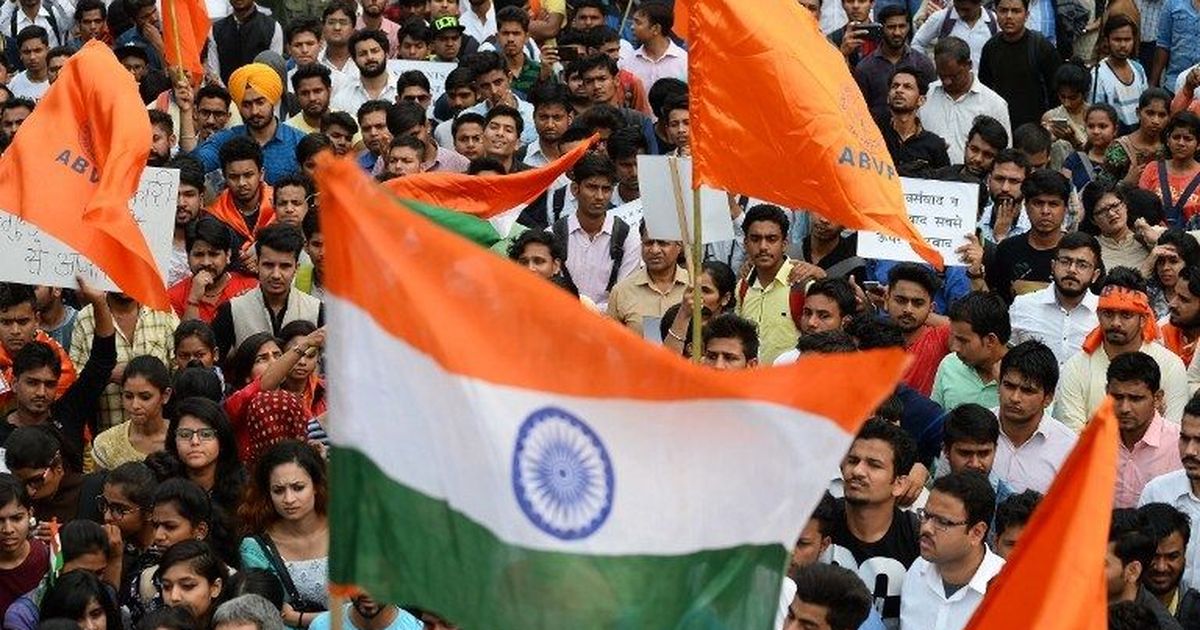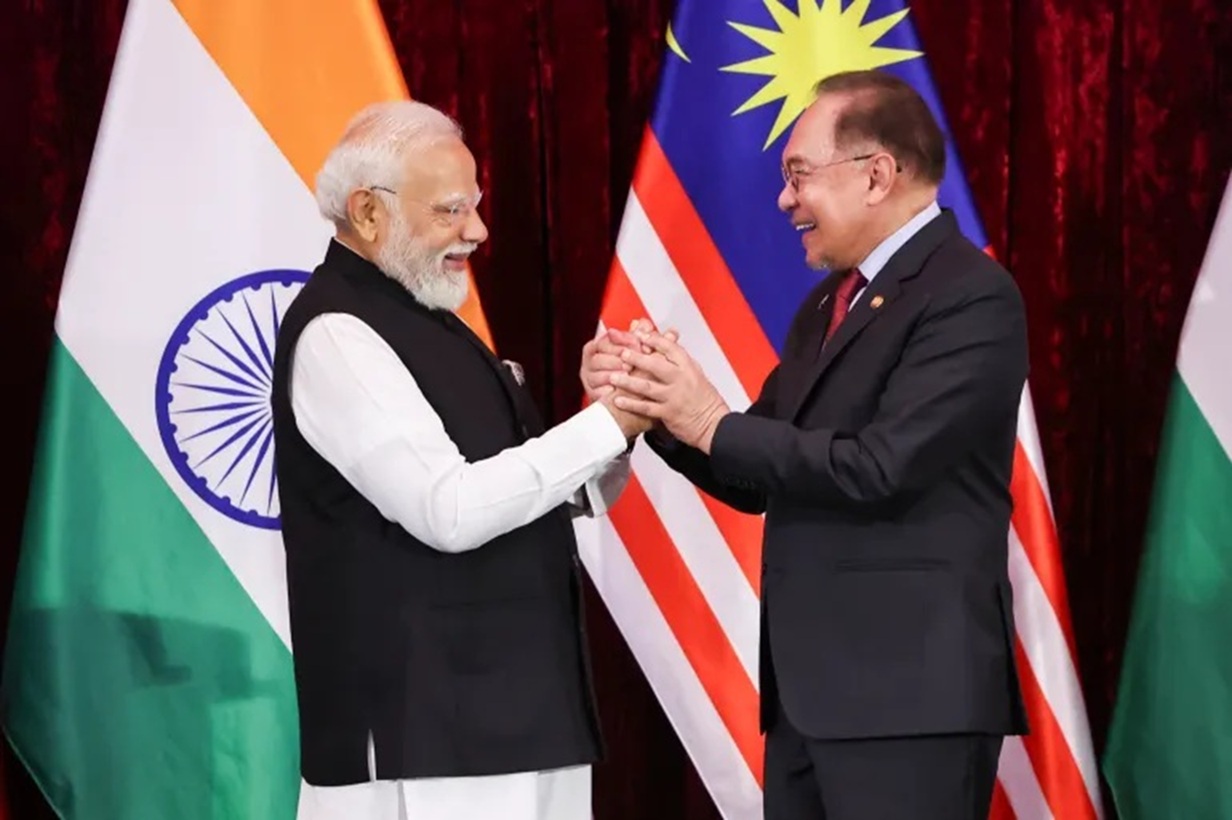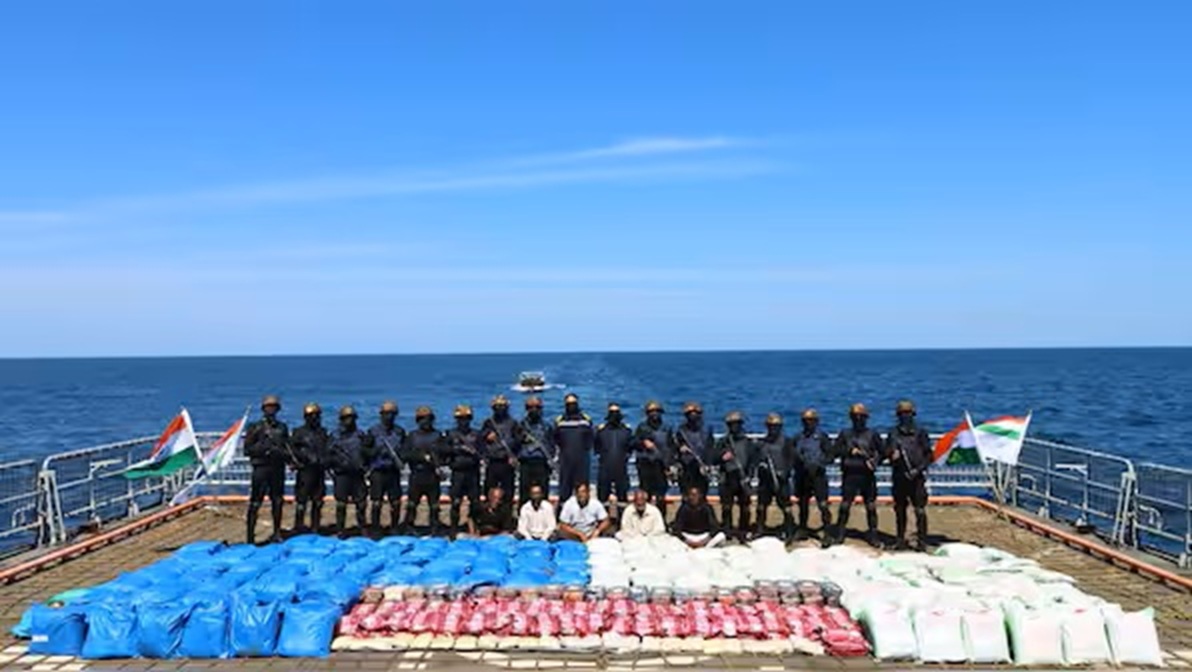Indian Nationalism is inclusive of all of the people of India, despite their diverse ethnic, linguistic and religious backgrounds. “A national spirit is necessary for national existence. A flag is a material aid to the development of such a spirit.” – Mahatma Gandhi.
Nationalism
Nationalism is defined as “identification with one’s own nation. and support for its interests, especially to the exclusion or detriment of the interests of other nations. It has been observed that we, as citizens of India, many a time forget our duties and responsibilities towards our country. As a result, we see so much discord in society, a lack of vigilance, and a resultant increase in deep state activities and terrorism. It is high time we not only take nationalism seriously but also imbibe it in its true spirit.
It would be important here for us to understand the main elements of nationalism. They include a shared identity and culture, which can be based on common language, religion, ethnicity, traditions, and history. A shared sense of belonging, national symbols, and a collective historical narrative also foster unity. Finally, the desire for political autonomy and sovereignty over a defined territory is a key component, as nationalism often involves a movement for self-governance(Geliner, 1983). We all understand that India is a secular country and comprises many languages, religions, and differing ethnicities. However, Indian culture has always respected all languages, religions, and ethnicities, creating a unique principle of Unity in Diversity, bolstering a sense of unity and belonging among our people.
We share a common history, which brings in a collective memory of past achievements, struggles, and significant events, helping create a sense of continuity and national identity. Our shared traditions, customs and values bind us together as a cohesive group. Our National symbols, like our revered tricolour, national anthem, and emblems, serve as visual reminders of our national identity and values.
In addition, a core element of our nationality is our desire for self-governance, and the nation’s ability to control its own political destiny without outside interference, because of strong democratic principles, and people’s support (Thakran, 2023).
Indian Nationalism-Historical Perspective
Nationalism in India took shape as a response to British colonial rule. The pains of foreign exploitation made Indian people rise and recognise their shared past and common future. The contemporary literature, social reforms, and cultural revival nurtured this collective spirit. Over time, this idea of unity transformed into a powerful movement that bound Indian people together in the struggle for independence. Post-independence, Indian nationalism has been shaped by the consolidation of a country with diverse languages and religions into a sovereign, secular, and democratic republic. But at the same time, it is being challenged by regional disparities and conflicts- both internal and external (V and R, 2025). Therefore, we need to be pragmatic in our approach to nurturing our nationalism, which is an amalgamation of many aspects. It is also important for us to note that many elements are involved in teaching, inculcating, and propagation Nationalism, and we need to understand those elements clearly.
Core Elements of Indian Nationalism
There are multiple constituents of Indian Nationalism, which need to be understood by the Indian people. They are:-
- Home Upbringing: The first and most important element which imparts Nationalism concepts is parents. In childhood, parents can sow the seeds of healthy nationalism in the minds of children. In olden days, in the Joint family concept, grandparents did this job effectively, but today, with nuclear families- made up of career-minded parents, the Sanskar ( upbringing) element is lacking, and its results are clear for us to see. But it is not too late. The parents can cut some time from the digital world and devote it towards the upbringing of the children. The youth also need to cut down time spent in the fake digital world, and read about the sacrifices made by thousands to gain freedom for our nation, and now being made by the armed forces to safeguard the same. The youth must make conscious efforts to inculcate the spirit of nationalism and propagate the same. The working people, too, need to devote some time towards building nationalism at workplaces and in society through volunteer work. The elder generation can devote their time gainfully to educating the masses on nationalism through voluntary work. It is the duty of every citizen to be proud of our nation and propagate nationalism.
- Educational Institutes: These obviously form a backbone for making the children and the youth aware of India’s glorious history and inculcating national pride and awareness of the sacrifices made & being made by many for their freedom. However, our education system has been slowly eroded by the deep state elements, both foreign and domestic, and the trend is becoming common to abuse and discard our history, our traditions, our culture, and most importantly, our family value system. It is important that all the stakeholders, including the government and the citizens, take this aspect seriously and adopt appropriate remedial measures to bring out our history and culture in the right perspective, for our children and youth to appreciate and be proud of.
- Cultural Aspects: Today’s youth seem to have abandoned the Indian culture and are overwhelmingly adapting the western culture, damaging health, mental well-being, law and order, and basing fabric of our nation, signifying unity in diversity. We are responsible for reversing that trend.
- Armed and Paramilitary Forces: These are paramount in safeguarding our freedom, borders, and also extend a helping hand when civil administration breaks down, leading to anarchy. We need to understand that the military does not mean only border security, and it has a much bigger role in maintaining national well-being. We as citizens must become the eyes and ears of our armed and paramilitary forces and strengthen our internal security. Further, it is important for all the stakeholders to avoid politicisation of the armed forces, the last standing bastion of secularity and impartiality.
- Political System: Our political system is equally responsible for eroding our nationalism. The power-hungry political parties are unashamedly getting into religion and casting divisive politics, which is detrimental to national security. We need to shun such political parties, and put our national interests foremost in our minds, and vote with consciousness, to bring the right political parties to power for good governance and security of our nation (Matrubhumi).
- Technological Aspects: Today, a plethora of technologies are available at the disposal of our younger generation. But, it is seen that our younger generation has become a slave to those technologies, rather than enslaving those technologies for the national and human well-being. We all need to learn to adapt the technologies in the right spirit and be vigilant to stop their misuse. To cite some examples, aspects like Facebook/WhatsApp/TikTok addiction (hampering the mental health of many), misuse of mass media for circulating false propaganda, non-reporting stark misuse of media to the relevant authorities in time, thereby allowing terrorist and other anti-national activities to increase and undermine our national security, need to be remedied.
- Economic Aspects: It has been observed that our basic deviation from Indian Nationalism has led to many complex economic issues, too. In that, out increasing absorption of western culture has led to consumerism, tendency to live beyond our own means, electively buying foreign products, which not only affects national production, but also leads to plastic money syndrome, out go of foreign exchange, enhancing dangers to national security (embedding malware in electronic products, transfer of data and funds to countries inimical to India’s interests- e. g. China), corruption, cyber-crimes, et al. we need to curb this tendency seriously.
- Demographical Elements: Demographic elements which are shaping Indian nationalism include the growth of the educated middle class and the influence of various socio-religious groups, all of which became key to articulating demands and mobilising public opinion against various issues. The concept of Indian Nationalism is itself diverse, reflecting India’s complex demographics, including a variety of ethnic communities and religious groups, with religion being a particularly influential and at times controversial factor. Let us examine some important demographic factors:-
- Educated Middle Class: The rise of an educated middle class, particularly professionals like lawyers, teachers, and journalists, has become the vanguard of their own movements. Their education in Western ideas of liberty and democracy, alongside their role in demanding social reforms, is in many cases taking us away from Indian Culture and ethos, which needs to be remedied. Freedom of speech and action is guaranteed by our constitution, but not at the cost of national security. Even the Hon Supreme Court has endorsed this view (V & R, Aug 2025).
- Religion: Religious identities are playing a significant role in the development of so-called modern nationalism, bringing in deep state and disruptive elements in play. These need to be curbed.
- Ethnicity and Language: The existence of numerous ethnic communities across India, each with distinct linguistic, social, and historical traditions, has led to a complex and varied form of nationalism that is not always uniformly Indian in nature. Homogenisation, without losing the distinct identity, is desirable and can be achieved with the right approach.
- Economic Factors: The factors like unemployment, rising inflation, & Corruption, the collapsing agricultural sector and subsequent migration problems ( urban vs. rural discords) have created distress in the populous, which has in turn fuelled resentment across the social strata, impacting the nationalistic spirit. This issue needs to be resolved by the state and central governments, on priority.
- Misuse of Demographic Differences: It has been observed that the demographic differences are being misused by Political parties to build narratives, tailor policies, and target voters, by selfish politicians to build coalitions and secure support, using aspects like caste, religion, region, or language, by unscrupulous political elements to redraw electoral districts- to favour certain groups or political parties, or build political narratives to achieve specific political goals, further politicizing demographic strata. We, as responsible citizens, need to defeat such divisive political approaches.
( Sources: Kumar, 2022, Thakran, 2023a)
It would be seen from the above analysis that in most of the aspects examined, the citizens have a major role to play. Therefore, citizens not only need to be aware of the above factors, but also need to work for spreading mass awareness, thereby helping the government in strengthening the nationalistic spirit.
Problems with Indian Nationalism
Our nationalistic commitment is defined by a specific geographical area, which we consider as our matrubhumi (homeland), and is supported by our democratic political ideology, which prioritises the interests and sovereignty of our nation. But for that to be enduring, citizens must have devotion and loyalty towards the nation- to foster a strong sense of pride, love, and loyalty towards our national history and its achievements. That is the element which seems to be missing today. This aspect needs to be understood clearly and remedied on a war footing.
There are many problems in propagating Indian Nationalism, which include internal challenges like religious tensions, regional aspirations, caste divisions, and economic inequality, as well as the negative consequences of extreme nationalism- such as intolerance, social exclusion, and the manipulation of patriotism. Historically, events like the partition of India also bring in the destructive potential of certain forms of nationalism, from time to time, highlighting how religious differences can be exploited and lead to violence.
Unfortunately, for the past few decades, nationalism has been associated with religious identity and connected to appeasement policies, which have led to increased religious tensions and exclusion. Though India’s diversity means that different regions should integrate in the national stream in harmony, they have now started displaying strong subnational identities and aspirations that are clashing with the desired national identity, a clash which needs to be resolved in the interest of our nation.
Further, though India has tried to create a collective identity by removing the cast factors, it has been struggling with deep-seated caste divisions that have hindered our social cohesion, leading to various problems, which are exploited by the power-hungry politicians.
Issues like poverty, unemployment, and economic disparities have also now become major social problems that have created a divide between different sections of the population, thus undermining the sense of national unity (Legal Bites, 2020).
In addition, the extreme or hyper-nationalism being displayed by some sections of our people has led to an us-versus-them mentality, where some people see our own nationalism as superior to others, fostering intolerance and discrimination against certain social groups. Social and political conflicts aid and abet such extreme nationalism, suppressing freedom of thought, dissent, and individual opinions, under the guise of patriotism, creating discord.
Measures to Foster Indian Nationalism
Having understood the problems with our nationalism, we as citizens need to be proactive and actively put relevant measures in place to minimise them. Such measures need to involve a blend of historical understanding and modern civic engagement, focusing on shared identity, cultural pride, and community welfare.
The foundation of our nationalism stands on several key strategies deployed during the Indian independence movement, many of which are still relevant today, for inspiring national pride. We need to adapt and encourage the use of domestically produced goods, which would help in strengthening the national economy and foster self-reliance, a core tenet of national pride, while reducing dependence on foreign nations and conserving valuable foreign currency.
We ourselves need to be proud of our rich history, ancient spiritual traditions, and diverse art forms, and propagate the same to instil a sense of collective pride and self-respect amongst others.
We must respect and promote the use of national symbols like the flag, national anthem, and iconic imagery, providing a visual and emotional identity for the nation, thus helping in creating a sense of collective belonging. Spreading education, particularly about the nation’s history, democratic values, and civic rights, would be important to help every citizen to understand their importance and his/her role in the nation’s progress (Roy, 2023).
We must also support free and responsible media that discuss national issues and highlight government policies (both positive and negative), helping in developing an informed and united public opinion. We also must work towards the removal of social evils and discrimination- helping in bringing different communities and classes together, strengthening national unity across all segments of our society.
The government to has an important role to play here. In contemporary India, for fostering nationalism, the government should:
- Encourage active participation of people in democratic processes, community service, and local governance, building a sense of ownership and responsibility toward the country.
- Ensure that the benefits of economic growth and social progress reach all citizens, regardless of background, strengthening the idea of a shared future and collective well-being.
- Emphasise India’s unique strength in its multicultural fabric, encouraging respect and understanding across different linguistic, religious, and regional groups.
- Engage in constructive national dialogue that focuses on finding solutions to shared challenges, moving beyond narrow partisan interests to the greater good of the nation.
We, the citizens of India, would do better by remembering the words of Mahatma Gandhi: –

PC: Quotefancy
Conclusion
Indian nationalism is a complex and multifaceted force which was pivotal in achieving independence by uniting diverse groups against colonial rule. But it is also a source of post-independence nationalism. It has been shaped by a unique blend of historical events, cultural revival, and diverse ideologies from leaders like Mahatma Gandhi, Rabindranath Tagore, and towering personalities like Dr Abdul Kalam and Atal Bihari Vajpayi.
The legacy of Indian nationalism is still a work in progress -even today, particularly regarding its interpretation in the context of a modern, democratic India, where it sometimes clashes with inclusive ideals. It needs to be understood that Nationalism has played a profound role in not only the freedom struggle but also in laying the foundation for India’s democratic and cultural evolution after independence, and no one has the right to undermine the same.
It is a fact that the modern Indian identity continues to grapple with the balance between national identity and inclusive, democratic values, with debates over its definition persisting in contemporary society, with many petty differences. We as citizens need to appreciate the important role of Nationalism in a nation’s progress and security, and be a source of inspiration for others, in removing the hurdles and inculcating the nationalistic spirit. Jai Hind.
Title Image Courtesy: iPleaders Blog
Disclaimer: The views and opinions expressed by the author do not necessarily reflect the views of the Government of India and the Defence Research and Studies

References
Admin, Legal Bites, Mar 12, 2020, The concept of Nationalism in India: Issues and Challenges, Legal Bites (Law and Beyond), Online, Retrieved from: https://www.legalbites.in/the-concept-of-nationalism-in-india-issues-and-challenges , Accessed on 17 Nov 2025
Geliner, Ernest, 1983, Nations and nationalism, Cornell University Press, Accessible through: https://archive.org/details/nationsnationali0000unse/page/n167/mode/2up, Accessed on 17 Nov 2025
Kumar, Ashwani, Sep 20, 20222, Origin and growth of Indian nationalism, RP World History and Cultural Studies Vol. 1, No. 1 (July – December 2022) pp. 9–13, e-ISSN: 2583-8156, Copy Accessible through: https://researchplateau.com/uploads/reasearchpapers/1688396954.pdf, Accessed on 17 Nov 2025
Roy, Binoy. (2023). Understanding Nationalism: Independence of the Indian Subcontinent and the Formation of Bangladesh. Praxis International Journal of Social Science and Literature. 6. 17-28. 10.51879/PIJSSL/060702, PDF Accessible through: https://www.researchgate.net/publication/372686995_Understanding_Nationalism_Independence_of_the_Indian_Subcontinent_and_the_Formation_of_Bangladesh. Accessed on 17 Nov 2025
Thakran, Seema, Indian Nationalism, Indian Journal of History (2023; 5(1): 199-204), E-ISSN: 2706-9117, Accessible through: https://www.historyjournal.net/article/226/5-2-8-662.pdf, Accessed on 17 Nov 2025
Vajiram and Ravi, Aug 31, 2025, Supreme Court’s Social Media Regulation Order: Free Speech and Accountability, Vajiram and Ravi, Online, Retrieved from: https://vajiramandravi.com/current-affairs/social-media-regulation-order/, Accessed on 18 Nov 2025
Vajiram and Ravi, Sep 02, 2025, Rise of Nationalism in India, Major Events, Significance, Vajiram and Ravi, Online, Retrieved from: https://vajiramandravi.com/current-affairs/rise-of-nationalism-in-india/, Accessed on 17 Nov 2025






